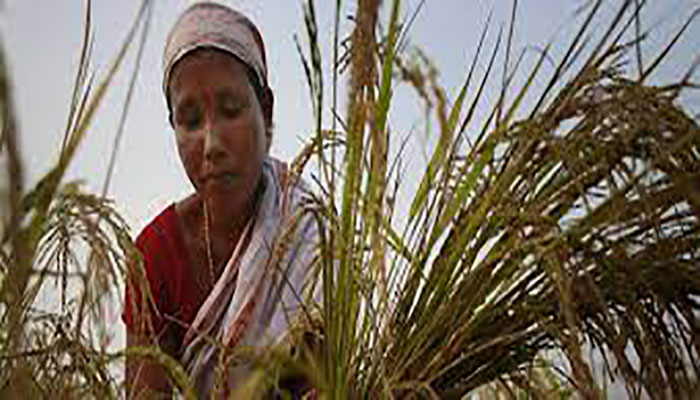Climate change impacting health of women agriculture workers, says study
The increased temperature has led to severe impacts on the livelihoods and health of women agriculture workers in Sindh. They face difficulties in breathing, and itching, heat stroke are common health problems among them.
It was the key finding of a study, titled ‘Impact of Rising Temperature on the Health of Women Farm Workers’, recently conducted by the Sindh Community Foundation, a rights-based organisation.
The study discusses initial evidence of the impact of climate change on human health, specifically women cotton pickers. According to the study, deforestation is one of the leading factors causing the temperature rising in Sindh. Fifteen years ago, Sindh had 2.2 million acres of land, of which 600,000 acres were under forests providing a better source of living to local communities. Sadly, now hardly 15 per cent of this 600,000 acres of forest in Sindh is now katcha (riverine) area, and the rest of the area was utilised for housing, development of infrastructure, and agriculture purposes after deforestation.
Citing the example of Matiari, a district located along the Indus River that once had thick forest and its maximum temperature used to be 42 degrees Celsius in the middle of summer, the study said that during the past five years, the average temperature of the district had increased to 48 degrees Celsius, impacting women agricultural workers’ working capacity during the cotton-picking season.
A number of women cotton workers experienced an increase in temperature and suffered from sunstroke and heat-related health problems, the study said. “There is lack of vegetation and removal of trees from agricultural lands compels them to sit in the open sky even during the break time. The shadow of trees has been reduced in the last 10 years,” reads the study.
“They [agriculture women workers] do not receive any compensation for health problems nor do they get support from their landlords. They have to go to a nearby health facility which [does not have] proper medicine and facilities.”
Health and occupational safety is the right of workers but the law does not cover the agriculture workers, the study found.
They study also revealed that due to locust attack and heavy monsoon falls, and severe pest infestation, production of cotton decreased dramatically and therefore women agricultural workers had been receiving lower wages than the current inflation rate.
The study also mentioned that the poor implementation of related legislation and policy measures such as the Sindh Women Agricultural Workers Act 2020, and Sindh Occupational Safety & Health Act 2017 had exacerbated the effects of climate change on the women agriculture workers.
-
 ICE Agents 'fake Car Trouble' To Arrest Minnesota Man, Family Says
ICE Agents 'fake Car Trouble' To Arrest Minnesota Man, Family Says -
 Camila Mendes Reveals How She Prepared For Her Role In 'Idiotka'
Camila Mendes Reveals How She Prepared For Her Role In 'Idiotka' -
 China Confirms Visa-free Travel For UK, Canada Nationals
China Confirms Visa-free Travel For UK, Canada Nationals -
 Inside Sarah Ferguson, Andrew Windsor's Emotional Collapse After Epstein Fallout
Inside Sarah Ferguson, Andrew Windsor's Emotional Collapse After Epstein Fallout -
 Bad Bunny's Star Power Explodes Tourism Searches For His Hometown
Bad Bunny's Star Power Explodes Tourism Searches For His Hometown -
 Jennifer Aniston Gives Peek Into Love Life With Cryptic Snap Of Jim Curtis
Jennifer Aniston Gives Peek Into Love Life With Cryptic Snap Of Jim Curtis -
 Prince Harry Turns Diana Into Content: ‘It Would Have Appalled Her To Be Repackaged For Profit’
Prince Harry Turns Diana Into Content: ‘It Would Have Appalled Her To Be Repackaged For Profit’ -
 Prince William's Love For His Three Children Revealed During Family Crisis
Prince William's Love For His Three Children Revealed During Family Crisis -
 Murder Suspect Kills Himself After Woman Found Dead In Missouri
Murder Suspect Kills Himself After Woman Found Dead In Missouri -
 Sarah Ferguson's Plea To Jeffrey Epstein Exposed In New Files
Sarah Ferguson's Plea To Jeffrey Epstein Exposed In New Files -
 Prince William Prepares For War Against Prince Harry: Nothing Is Off The Table Not Legal Ways Or His Influence
Prince William Prepares For War Against Prince Harry: Nothing Is Off The Table Not Legal Ways Or His Influence -
 'How To Get Away With Murder' Star Karla Souza Is Still Friends With THIS Costar
'How To Get Away With Murder' Star Karla Souza Is Still Friends With THIS Costar -
 Pal Reveals Prince William’s ‘disorienting’ Turmoil Over Kate’s Cancer: ‘You Saw In His Eyes & The Way He Held Himself’
Pal Reveals Prince William’s ‘disorienting’ Turmoil Over Kate’s Cancer: ‘You Saw In His Eyes & The Way He Held Himself’ -
 Poll Reveals Majority Of Americans' Views On Bad Bunny
Poll Reveals Majority Of Americans' Views On Bad Bunny -
 Wiz Khalifa Thanks Aimee Aguilar For 'supporting Though Worst' After Dad's Death
Wiz Khalifa Thanks Aimee Aguilar For 'supporting Though Worst' After Dad's Death -
 Man Convicted After DNA Links Him To 20-year-old Rape Case
Man Convicted After DNA Links Him To 20-year-old Rape Case




